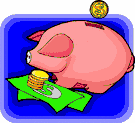Disposable Income
|

|
|
Share This Page
|
|
|
|
|
|
|
Follow This Site

|
 |
|
|
|

|
Disposable income is one of the standard terms of economics and finance. It is a difficult-sounding word that has a simple definition. That definition is this: Disposable income is whatever is left over after taxes.
This concept is most easily illustrated with a paycheck, money you get for doing a regular job. Let's say that you earn $50 a week and that your tax rate is 20 percent. The $50 minus 20 percent is $40, since 20 percent of 50 is 10 and 50 minus 10 is 40. So your disposable income for the week is $40.
 (You could also figure out your disposable income for the month, which is $40 times 4, which is $160, and for the year, which is $160 times 12, which is $4400).
(You could also figure out your disposable income for the month, which is $40 times 4, which is $160, and for the year, which is $160 times 12, which is $4400).
The term disposable income comes from the idea that you have money left over to dispose of, or spend, as you wish. In general, the more money you make, the more disposable income you will have (although you are also taxed at a higher rate).
A person or family can make a budget for the month based on disposable income and know exactly how much money they will have that month to spend on things like rent or mortgage, food, insurance, car payments, and entertainment. One thing that person or family shouldn't forget, however, is savings.
 It's always a good idea to save money. You never know when you're going to need money to pay for unexpected things, such as a birthday present for a friend or medical costs related to an accident. If you don't have any money set aside as savings, you'll have a difficult time paying your other bills because you'll have to borrow some of what you've earmarked for food to pay hospital beds.
It's always a good idea to save money. You never know when you're going to need money to pay for unexpected things, such as a birthday present for a friend or medical costs related to an accident. If you don't have any money set aside as savings, you'll have a difficult time paying your other bills because you'll have to borrow some of what you've earmarked for food to pay hospital beds.
One common thing that people do when they don't have money right away to pay for something is to use a credit card or otherwise borrow money. These loans always have interest attached to them; and the longer you take to pay back the loan, the more money you'll pay in the end. This is because you'll be paying not only the money that you borrowed but also the interest on that money that you borrowed.